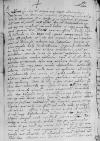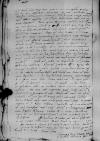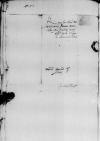Letter #2714
Marco de la TORRE to Ioannes DANTISCUSCracow, 1544-04-12
English register:
Marco de la Torre explains he did not reply to Dantiscus’ last letter due to a serious illness that incapacitated both his hands and his mind.
Then, plague raged in Cracow for five months. More than 300 people died daily. Completely healthy, unexpectedly succumbing to the disease, they died on the second or third day. There was a shortage of labour to bury the dead, so corpses lay in fields, orchards and gardens. The few who seemed to recover died of emaciation due to the food shortage. Trade was halted, and refugees were not allowed to enter nearby localities so they were forced to return to the site of the epidemic.
Many clergymen also died. Most of Marco de la Torre’s fellow friars survived thanks to the powder dissolved in wine that Marco ordered them to take. He also ordered the powder to be distributed from dawn till dusk among the poor in the garden of the convent’s cloisters. Those who took the medicine in time and had access to food, survived. He was greatly saddened by the death of four of the friars distributing the medicine.
Marco de la Torre always remembers Dantiscus’ generosity, kindness, courage and courtesy. He regrets that he cannot keep company with him more often. He thanks him for the honour of having had Dantiscus as a guest at the convent.
He describes the state of his health: he still suffers from catarrh, which went away for the duration of the plague, only to return in October. Due to his illness he is forced to send his Provincial (minister), a learned man of impeccable reputation [Francesco Lismanino], to celebrate services for the queen [Bona].
He notes that Poland’s rulers (serenissimi principes nostri) are planning to go to Lithuania.
| received Heilsberg (Lidzbark Warmiński), 1544-04-22 Manuscript sources:
| ||||||
Text & apparatus & commentaryPlain textText & commentaryText & apparatus
Reverendissimo in Christo Patri, Domino, domino
In
Reverendissime in Christo Pater et Domine, domine fautor observandissime.
Post animi mei devotionem singularem et perpetuam felicitatem etc.
Non sit admirationi Paternitatis Vestrae Reverendissimae, quod in rescribendo ad primas cf.
Ex religiosis multi hoc pestifero contagio istinc migrarunt. Ex nostris minor numerus, licet omnes correpti fuerint, redacti tamen in pristinam valetudinem Dei immortalis gratia et mea diligentia, qua ne dum mei fratres, sed multi cives et religiosi sunt relevati, officium namque in horto ambitus ab ortu solis ad occasum usque distribuendorum pulverum ad hoc propositum susceperam contagiosi morbi propellendi convenientissimorum pauperibusque in vino potandos praebebam. Ex quo multi evasere remedio. Si qui tamen eorum mortui sunt, vel non in tempore venerunt, nisi cum iam virus occupaverat cor, vel non minutione praemissa, aut alimentis ad reficiendam naturam destituti, suum obibant diem.
Tametsi vero hoc pium et sanctum opus exer[...] text missing⌈[...][...] text missing⌉,  BK, 230, p. 100 visum tamen fuit Domino Deo, cuius intuitu haec agebam, quattuor ad hoc opus applicatos absumere. Quod incommodum, quamquam compressis toleraverim humeris, nihilominus tanta animum meum affecit maestitia, ut illud
„cf. Vulg. Iob 10:1:1 ⌊taedet animam meam vitae meaecf. Vulg. Iob 10:1:1 ⌋” saepius repeterem.
BK, 230, p. 100 visum tamen fuit Domino Deo, cuius intuitu haec agebam, quattuor ad hoc opus applicatos absumere. Quod incommodum, quamquam compressis toleraverim humeris, nihilominus tanta animum meum affecit maestitia, ut illud
„cf. Vulg. Iob 10:1:1 ⌊taedet animam meam vitae meaecf. Vulg. Iob 10:1:1 ⌋” saepius repeterem.
Non igitur, Reverendissime Domine, neglectus aut oblivio mei tam diuturni silentii in causa exstitit, quo minus debito officii in respondendo satisfacerem, sed fatale impedimentum aliorsum me traxerat. Neque enim, etsi conarer, illam singularem Paternitatis Vestrae Reverendissimae humanitatem et beneficam atque heroicam naturam et affabilem conversationem (absit assentatio) oblivisci possem. Idcirco, cf. Verg. A. 4.336 dum memor ipse mei, dum spiritus hos regit artus ⌊quamdiu spiritus hos rexerit artuscf. Verg. A. 4.336 dum memor ipse mei, dum spiritus hos regit artus ⌋, cf. Verg. A. 1.609 semper honos nomenque tuum laudesque manebunt; Verg. Ecl. 5.78 ⌊semper nomen virtutesque Paternitatis Vestrae Reverendissimae apud me manebuntcf. Verg. A. 1.609 semper honos nomenque tuum laudesque manebunt; Verg. Ecl. 5.78 ⌋. Utinam in tali loco essem constitutus, ut saepius cum illa cf. Verg. A. 1.408-409 cur dextrae iungere dextram non datur ac ueras audire et reddere uoces?; Verg. A. 6.688-689 datur ora tueri, nate, tua et notas audire et reddere uoces ⌊audire et reddere vocescf. Verg. A. 1.408-409 cur dextrae iungere dextram non datur ac ueras audire et reddere uoces?; Verg. A. 6.688-689 datur ora tueri, nate, tua et notas audire et reddere uoces ⌋, ac sua suavissima frui consuetudine possem, quod ad magnam animi mei consolationem et felicitatem ascriberem.
Quod autem scribit se convaluisse et pristinae valetudini restitutam, plurimum gratulor Dominationi Vestrae Reverendissimae et Divinam Maiestatem summis precibus humiliter obsecro, eam in hac adepta incolumitate quam diutissime tueri et conservare dignetur.
In hospitalitate repetita praeoccupavit Paternitas Vestra Reverendissima meas vices. Meum erat enim illi agere gratias, quod nostrum non spreverit hospitium, quandoquidem multum decoris et splendoris nobis ex incolatu tanti hospitis accessisse non inficior.
De mea autem sospitate quid scribam, nisi illud: „sicut erat in principio, et nunc”. Adhuc enim mihi lis est cum catharro, cum quo per omne tempus pestis indutias habebam. Sed in Octobre, nescio quo malo genio, repullulavit. Quapropter nequivi ad serenissimam
Valeat Paternitas Vestra Reverendissima diutissime sospes et me suum obsequentissimum solita amplecti gratia non desistat.
Dat(ae) or Dat(um)⌈Dat(ae)Dat(ae) or Dat(um)⌉
Eiusdem Paternitatis Vestrae obsequentissimus frater
Postscript:
Serenissimi
Si favore Vestrae Reverendissimae Paternitatis nancisci possem vasculum similem, quo me donavit de Muscatis, magno quovis mercarer pretio, quia meo conducunt stomacho.


